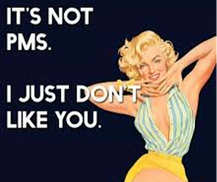|
Here’s a secret- every time I’ve broken up with someone, I’ve been on the cusp of my period. I always thought it was a weird coincidence, but then I looked into the science explaining what happens in your brain during your menstrual cycle. Now everything’s starting to make sense… Julie Holland, MD, clearly explains the science behind your mood swings in her book, Moody B*tches. Your mood swings can be attributed to two main chemicals: estrogen and serotonin. Both of these neurochemicals make you happy. Serotonin acts as a mood stabilizer, making you feel emotionally stable, focused, and energetic. Estrogen increases the amount of serotonin in your brain, and also helps modulate your feelings and suppress your stress response. During the first phase of your cycle, which starts after your period ends, serotonin and estrogen are both relatively high. These neurochemicals peak during ovulation. During the next part of your cycle, these hormones begin to decline. This brings us to PMS. PMS occurs the week before your period after you’ve ovulated and the egg hasn’t been fertilized. Your estrogen levels and serotonin levels drop. You're less stress-resilient. Your pain tolerance is at its lowest. With these lower levels of neuromodulators and stress-deflectors, it’s no wonder your mood might be different than the rest of the month. Holland describes how these hormone fluctuations make sense from an evolutionary perspective. The higher estrogen levels the rest of the month create what Holland refers to as “a veil of accommodation”(Moody B*tches, 39). Estrogen is highest when our bodies are trying to find a mate to reproduce with, right when we’re at our most fertile before and during ovulation. Estrogen makes us flirty and easy-going, both useful when trying to find a partner for that egg. When these estrogen levels drop before your period, that veil is lifted. Your sensitivity increases and your mood is less stable. Your body is less inclined to accept substandard treatment from a partner (or anyone, for that matter) because you’re not going to have a baby. You don’t need those essential support systems in place for pregnancy, because you’re not pregnant. It can be tempting to ignore the things that get under your skin and chalk them up to your period- you were just PMS-y when you cried after your boyfriend was late to pick you up, or when your mom and you got into a shouting match, or when you threw that towel at your roommate after she left it on the floor. These outbursts and displays of emotion get swept under the rug as we diminish them by attributing it all to our fluctuation hormones. But what if we didn’t dismiss them? Instead of minimizing and pretending these unruly feelings don’t matter, we can instead choose to take the time to sit down and listen to ourselves. I’d bet that whatever you’re having an outburst about on your period is something that bugs you all month, and you just keep a lid on it (aided by the higher levels of happy chemicals). Take advantage of this time of insight. You don’t have to dump your boyfriend, but you can listen to what you’re feeling and devote time to journaling, taking a meditative walk, or talking with a close friend about the state of your life. What commitments can you shed next month? As your serotonin and estrogen levels drop, lean into the rawness that surfaces. What’s weighing on you? And finally, no more saying, “Oh, ignore me. I’m just PMS-ing”. Rachel Desmond Women's Health Program Manager Credit: Sarcastic 1950s Housewife Memes That Hit Oh So Close To Home | Team Jimmy Joe |
Categories
All
Archives
June 2023
|


 RSS Feed
RSS Feed